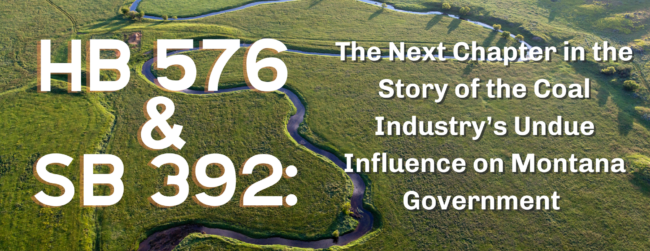
By Derf Johnson
For anyone that paid attention to MEIC’s lobbying efforts during the 2023 Montana Legislature, you will recall two bad coal mining bills that weaved through the process and ultimately became law. These bills were championed by the coal industry as a way to eliminate legal challenges by citizens and nonprofits to coal mining operations (SB 392, Sen. Steve Fitzpatrick, “loser pays”) and to reduce water quality protections so that companies could pollute more without repercussions (HB 576, Rep. Rhonda Knudsen, “material damage”). Because both of these bills made changes to Montana’s coal mining laws, the U.S. Office of Surface Mining (OSM) must approve them before they go into effect. This requirement is part of our cooperative federalism agreement and ability for Montana to continue running the program.
However, the Montana Legislature, always eager to poke the feds in the eye, put an immediate effective date on the bills with the intent of having the new laws be applicable immediately (rather than after OSM approval). Because this was illegal, MEIC took the Montana Department Environmental Quality (DEQ) to court to prevent their immediate implementation. Thankfully, because the law on this subject is crystal-clear, MEIC quickly reached a stipulated agreement with DEQ in which the agency agreed to not “take any action to apply, effectuate, or enforce the provisions of HB 576 or SB 392” for seven months (See the September 2023 issue of Down to Earth for more information). While this stipulated agreement hit a “pause” button on DEQ enforcement of the laws, the final resolution of the case, and the fate of the two laws, still remains.
Notably, after the stipulation was entered with the court, Montana Attorney General Austin Knudsen and Westmoreland Rosebud Mining (WRM) filed motions to intervene in the case. Interestingly, the Office of the Attorney General appears to be unhappy with the legal defense lodged by DEQ, whereby it agreed to not enforce the two laws until federal OSM approval occurs. WRM, on the other hand, was primarily concerned with the ability to seek attorneys fees from organizations and individuals so that it could discourage legal challenges and continue mining coal uninterrupted. MEIC also reached a proposed settlement with DEQ (through a consent decree) that basically mirrors the stipulated agreement and would prohibit the DEQ from enforcing the laws. On November 1, the judge put a “stay” on the case through the end of the year, delaying the potential for the consent decree to be finalized. Because of the stipulation that MEIC and DEQ reached, the laws will not go into effect until January 19 (or hopefully never).
Additionally, as required under the Surface Mine Control and Reclamation Act (SMCRA), the DEQ requested that OSM conduct a review and approve the two changes to the law. Lucky for us (and for our water), SMCRA was designed to protect the environment from coal mining and encourage citizen participation and accountability.
OSM’s review process is now fully underway, and if popular sentiments carry the day, as exhibited by the public comments at a hearing on November 1 in Billings, OSM would be hard pressed to approve these two laws. Of the 50 people who showed up, about 20 commented, including Anne Hedges with MEIC. All but one person — the legislator who sponsored one of the bills — spoke in opposition. Tribal members, ranchers, lawyers, and average Montanans strongly urged the OSM to reject both of the changes. Notably, concerns over water quality, public participation, and climate change were repeatedly brought up as reasons for OSM to reject the changes. Perhaps most compelling were the written comments from the Northern Cheyenne Tribe urging OSM to protect water quality and reject both bills.
Now that the public hearing and comment period are wrapped up, OSM will make a final decision on approval or denial of SB 392 and HB 576. We expect OSM to reject all or most of these laws, as they do not comply with the intent, letter, or spirit of SMCRA. Of course, any decision that OSM makes will be subject to legal review, and so this sordid tale of undue influence by the coal industry is likely far from over.
This article was published in the December 2023 issue of Down To Earth.

